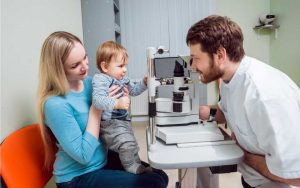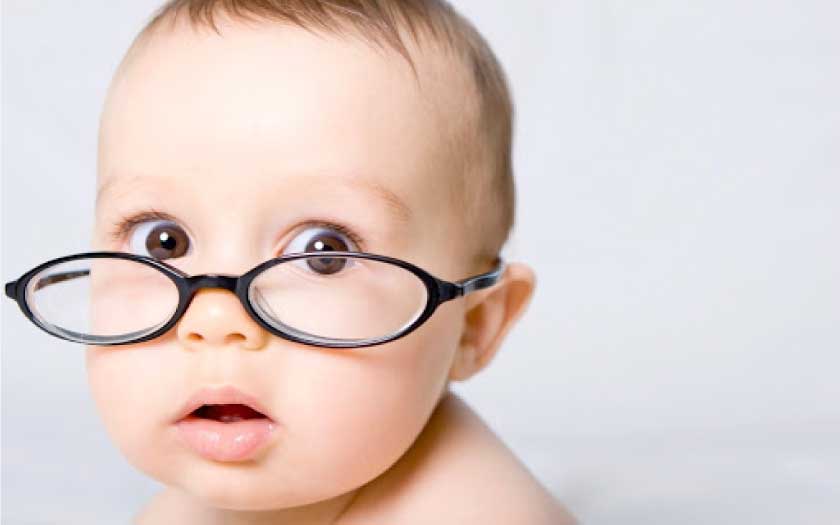Babies depend solely on their parents for everything they need while they grow and develop, and this includes the health and well-being of their eyes. Read on…
Baby eye examinations
A baby’s eyes will be screened for eye issues by the doctor at every checkup starting from birth, similarly to the way your baby is checked for issues pertaining to hearing, breathing, and, heartbeats. Any eye problems such as infection will be treated where else serious issues will probably be referred to as a medical eye specialist, or ophthalmologist.

When examining a baby’s eyes, here’s what you’ll likely see:
- Your doctor will check for signs of congenital eye conditions and other problems. The structure and alignment of your baby’s eyes and the ability to move them correctly will also be looked at.
- You will be asked about your family’s eye health history, e.g. blindness, cataract, color blindness, etc.
- Baby’s eyes, including the eyelids and the eyeballs, will be checked with a penlight for discharge and other signs of infection, allergy, disease, or blocked ducts.
- The size of the baby’s pupils will be checked to ensure they are equal in size, the right shape, and react well to light. Even the position and condition of your baby’s eyelids and lashes will be checked.
- By the time your baby is 2 – 3 months old, the doctor will be able to check for proper eye movement. This is done by observing how your baby’s eyes are able to fix on an object (like a toy) and follow it as it is moved along in different positions. This test will be done on each eye and both together. If your baby follows the object with one eye but consistently doesn’t follow it with the other eye, it’s a sign that there is an issue with the eye that is responding poorly.
- Your baby’s doctor will refer you to a specialist if a potential problem that is not in his or her area of expertise is detected.
The earlier the better
Eye issues in little children are not easy to spot and many of them are discovered way later than necessary because parents either missed the clues or did not take their little ones’ eye care issues seriously.
Eyecare for toddlers
By the age of three, your little one should undergo a thorough optometric eye examination to ensure a well-developing vision free from eye diseases. If needed, the optometrist can prescribe treatment, including eyeglasses and/or vision therapy, to correct a vision development problem.
Thanks to advancements and technology in modern eye care, a toddler does not have to know the alphabet or how to read to have his or her eyes examined!
Make the most of your child’s appointment with the optometrist:
- Make an appointment early in the day as possible
- Talk about the appointment in advance and don’t dismiss any of your child’s questions regarding it
- Explain the examination in terms your child can understand
Unless there is an issue to be addressed pertaining to your child’s eyesight, the next eye examination will probably be by the age of five. By then a comparison between the results of the two examinations would indicate how your child’s vision is developing and if there are any issues to address.
What eyecare professionals are known as
There are many kinds of occupations pertaining to eye-care, from eye-doctors to opticians. Here are a few you should know about.
Ophthalmologists
Medical doctors who have graduated from medical school and completed, at minimum, an internship and a three-year residency. An ophthalmologist can carry out eye exams as well as prescribe eyeglasses and contact lenses. They will also diagnose and treat eye diseases, prescribe medications, and perform eye surgery if necessary.
Pediatric ophthalmologists
This is a doctor who has completed a year-long fellowship in the surgical and medical treatment of eye disease in children after finishing four years of residency training.
Optometrists
These are not medical doctors but doctors of optometry. They are trained and licensed to examine the eyes, diagnose eye issues, and treat vision problems with glasses, contacts, and therapy. They also prescribe some medications.
Opticians
An optician makes and dispenses glasses and other optical items. He or she is trained to fulfill the lens prescription provided by the ophthalmologist or the optometrist, quite like what a pharmacist does for doctors’ prescriptions.
Featured image source: Carabin Eye Care


